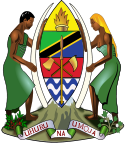- National Assembly of Tanzania
-
Tanzania 
This article is part of the series:
Politics and government of
Tanzania- President (List)
- Vice President
- Prime Minister
- Cabinet
- National Assembly
- Speaker
- Anne Makinda
- Speaker
- Political parties
- Elections: 2005, 2010
- Subdivisions
- Foreign relations
Zanzibar

- President
- Vice Presidents
- Seif Sharif Hamad
- Seif Ali Iddi
- Revolutionary Government
The National Assembly of Tanzania and the President of the United Republic make up the Parliament of Tanzania. [1] The current Speaker of the National Assembly is Hon. Anna Makinda[2], who presides over an assembly of 357 members[3].
Contents
History
The National Assembly of Tanzania was formed as the Legislative Council of Tanzania Mainland – then known as Tanganyika – in 1926. The Council was formed under a law enacted by the British Parliament called the Tanganyika Legislative Council Order and Council. The law was gazetted in Tanganyika on 18th June 1926. The Council consisted of 20 members when it was formed on the 7th of December 1926 under the Chairmanship of the Governor of Tanganyika, Sir Donald Cameron.
The first Speaker was appointed to replace the Governor as the Chairman of the Council in 1953. The office of Speaker was first occupied on the 1st of November, 1953.
In 1958, the Council got a few elected representatives for the first time. This was the first election allowed in the colony. Of the three political parties which participated in the elections, namely Tanganyika African Union (TANU), United Tanganyika Party (UTP) and African National Congress (ANC), only TANU won in some constituencies, thus becoming the first party to have elected members on the Council.
Second elections for positions on the Council were held in 1960. These elections were part of the preparations being made to make Tanganyika an independent nation. All members appointed by the Governor were abolished and the people of Tanganyika were allowed to elect all members of the Council.
In the same year, the name of the Council was changed to Legislative Assembly. The changes made in this year were constitutionally necessary so as to allow the President of Tanganyika to accent all laws passed instead of the Queen of England[4].
Mandate
The Parliament – the National Assembly and the President of the United Republic - obtains its mandate and functions from Chapter 3 of the Constitution of United Republic of Tanzania. The Constitution contains Articles that grant for the establishment, composition and functions of the Parliament[5].
Functions
The Parliament has powers to deal with both Union and non-Union issues which are not in the scope of the Zanzibar Government. It is responsible for discussing bills and passing laws. It also scrutinizes the actions of the Executive arm of the Government[6].
Structure
Article 66 of the Constitution of Tanzania outlines the following categories of members:
1. Members elected to represent constituencies;
2. Women members whose number shall increase progressively starting with twenty per cent of the members named in sub-paragraphs (1), (3) and (4) of this paragraph, to be elected by the political parties that are represented in the National assembly in terms of Article 78 of the Constitution and on the basis of proportional representation amongst those parties;
3. Five members elected by the Zanzibar House of Representatives from among its members;
4. The Attorney General;
5. Not more than ten members appointed by the President.After the 2010 elections, a total of 357 members made up the National Assembly. Of the 357 members, 239 were elected from constituencies. The special seats for women totalled 102, while the Zanzibar House of Representatives elected five members to represent it in the Parliament. The remainder of the membership was made up by the Attorney General and ten appointments by the President[8].
The current Speaker is Hon. Anna Makinda, the first female speaker in the Assembly’s history[9].
See also
- List of Speakers of the National Assembly of Tanzania
References
- ^ "Constitution of the United Republic of Tanzania". http://www.parliament.go.tz/bunge/katiba/legrole.pdf. Retrieved 20 December 2010.
- ^ "Administration of the Parliament of Tanzania". http://www.parliament.go.tz/bunge/administrations.php?office_id=1. Retrieved 20 December 2010.
- ^ "Structure of the Parliament of Tanzania". http://www.parliament.go.tz/bunge/aboutus.php?cat=2&subcat=4. Retrieved 20 December 2010.
- ^ "History of the Parliament of Tanzania". http://www.parliament.go.tz/bunge/aboutus.php?cat=2&subcat=5. Retrieved 20 December 2010.
- ^ "Mandate of the Parliament of Tanzania". http://www.parliament.go.tz/bunge/aboutus.php?cat=2&subcat=1. Retrieved 20 December 2010.
- ^ "Functions of the Parliament of Tanzania". http://www.parliament.go.tz/bunge/aboutus.php?cat=2&subcat=2. Retrieved 20 December 2010.
- ^ "Structure of the Parliament of Tanzania". http://www.parliament.go.tz/bunge/aboutus.php?cat=2&subcat=4. Retrieved 20 December 2010.
- ^ "Structure of the Parliament of Tanzania". http://www.parliament.go.tz/bunge/aboutus.php?cat=2&subcat=4. Retrieved 20 December 2010.
- ^ "History of the Parliament of Tanzania". http://www.parliament.go.tz/bunge/aboutus.php?cat=2&subcat=5. Retrieved 20 December 2010.
External links
Sovereign states Algeria · Angola · Benin · Botswana · Burkina Faso · Burundi · Cameroon · Cape Verde · Central African Republic · Chad · Comoros · Democratic Republic of the Congo · Republic of the Congo · Côte d'Ivoire · Djibouti · Egypt · Equatorial Guinea · Eritrea · Ethiopia · Gabon · The Gambia · Ghana · Guinea · Guinea-Bissau · Kenya · Lesotho · Liberia · Libya · Madagascar · Malawi · Mali · Mauritania · Mauritius · Morocco · Mozambique · Namibia · Niger · Nigeria · Rwanda · São Tomé and Príncipe · Senegal · Seychelles · Sierra Leone · Somalia · Somaliland · South Africa · South Sudan · Sudan · Swaziland · Tanzania · Togo · Tunisia · Uganda · Western Sahara · Zambia · Zimbabwe
Dependencies,
autonomies,
other territoriesCanary Islands / Ceuta / Melilla (Spain) · Madeira (Portugal) · Mayotte / Réunion (France) · Saint Helena / Ascension Island / Tristan da Cunha (United Kingdom) · Zanzibar (Tanzania)
Italics indicate an unrecognised or partially recognised state. Categories:- Parliaments by country
- Government of Tanzania
- National Assembly of Tanzania
- Dodoma
- Unicameral legislatures
Wikimedia Foundation. 2010.
